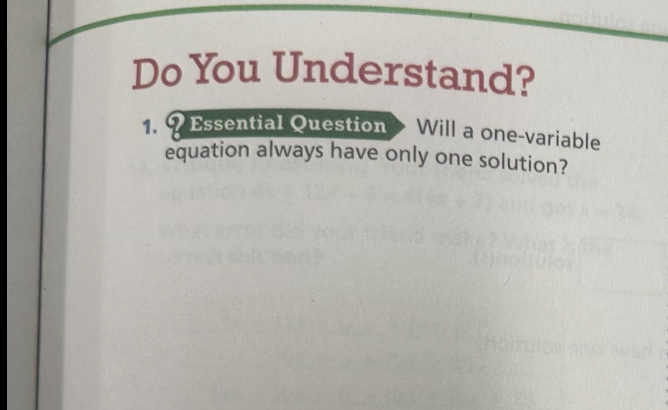Will a one-variable equation always have only one solution?

Understand the Problem
The question is asking whether a one-variable equation will always result in a single solution, exploring the nature of such equations in mathematics.
Answer
A one-variable equation can have zero, one, or multiple solutions, depending on its form.
Answer for screen readers
A one-variable equation does not always have only one solution; it can have zero, one, or multiple solutions depending on its type.
Steps to Solve
- Understand the types of one-variable equations
One-variable equations can be linear equations (e.g., $ax + b = 0$) or quadratic equations (e.g., $ax^2 + bx + c = 0$). The nature of these equations can determine the number of solutions.
- Examine linear equations
A linear equation typically has the form $ax + b = 0$. When you solve for $x$, you will generally find one solution unless $a = 0$, which would lead to no solutions or infinitely many (if also $b = 0$).
- Examine quadratic equations
Quadratic equations take the form $ax^2 + bx + c = 0$. The number of solutions depends on the discriminant ($D = b^2 - 4ac$):
- If $D > 0$: two distinct solutions.
- If $D = 0$: one solution (a repeated root).
- If $D < 0$: no real solutions.
- Illustrate with examples
Consider the linear equation $2x - 4 = 0$. Solving gives: $$ 2x = 4 \implies x = 2 $$ That's one solution.
For the quadratic equation $x^2 - 4x + 4 = 0$, the discriminant is $b^2 - 4ac = 0$. Thus there's one repeated solution: $$ x = \frac{-b}{2a} = \frac{4}{2} = 2 $$.
- Conclusion on one-variable equations
Thus, a one-variable equation does not always have one solution. It can have zero, one, or multiple solutions depending on its type and specific coefficients.
A one-variable equation does not always have only one solution; it can have zero, one, or multiple solutions depending on its type.
More Information
The nature of the solutions varies with the type of equation. Linear equations usually have one solution, while quadratic equations may have zero, one, or two solutions based on the discriminant.
Tips
- Assuming all forms of one-variable equations have one solution without considering the type (linear vs. quadratic).
- Confusing the discriminant with other aspects of quadratic equations.
AI-generated content may contain errors. Please verify critical information